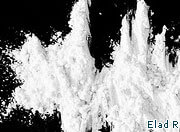A second so-called ‘legal high’, NRG-1, has been banned and made a Class B drug, the Government Minister for Crime Prevention James Brokenshire has announced.
The substance is similar to Mephedrone, which was banned in April after being linked to a spate of young deaths in the UK.
The Government’s drugs watchdog, the Advisory Council for the Misuse of Drugs (ACMD) had recommended a ban on Naphyrone, sold as NRG-1, saying it could “cause real harm due to its potency and associated health effects”.
Dangerous
Prof Les Iversen, who chairs the ACMD, warned earlier this month that the drug was “ten times stronger in its potency than cocaine”.
The substance is said to cause heart and psychiatric conditions, including anxiety, hypothermia and dependence liability.
Other drugs currently in the class B category include cannabis and amphetamines.
Offence
James Brokenshire said: “The Government is deeply concerned about the use of ‘legal highs’ which is why we took swift action to ban this new drug.
“Anyone buying a legal high is putting their health at risk and could be committing a criminal offence.”
There was clear evidence that substances were being advertised as being legal even when they were not, he added.
Penalties
Naphyrone has been banned under the Misuse of Drugs Act 1971. Class B drugs carry a maximum penalty of five years in prison for possession and 14 years in prison for supply, alongside an unlimited fine.
Earlier this year it was revealed that five out of six people caught with cannabis escape prosecution despite the fact that it is a Class B drug.
There are now more than 22,000 people a year, almost half under the age of 18, being treated for cannabis addiction. In 1997 the number was 1,600.
In December a new study revealed that a stronger form of cannabis, known as skunk, which is common on British streets, is almost seven times more likely to trigger psychosis than ordinary cannabis.

